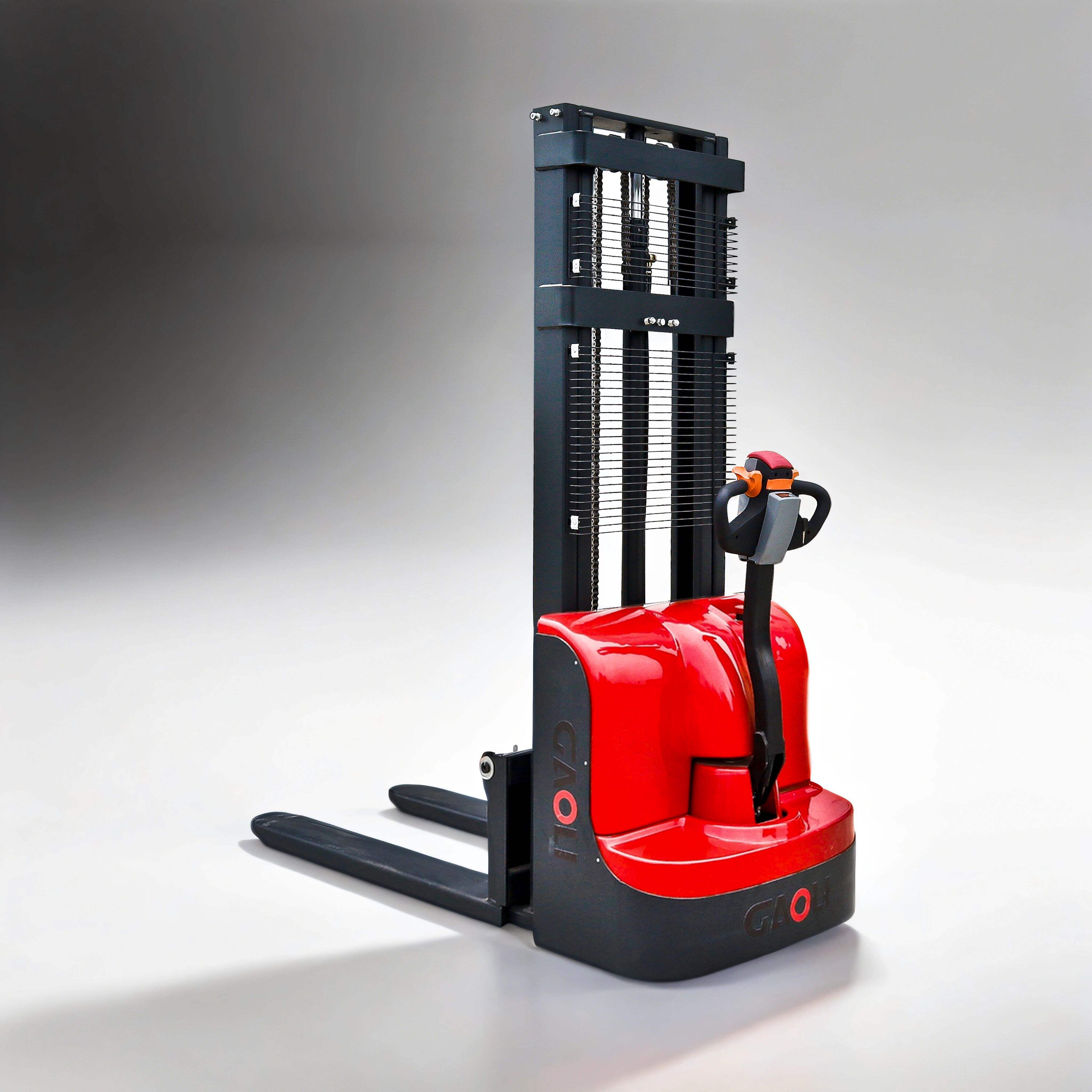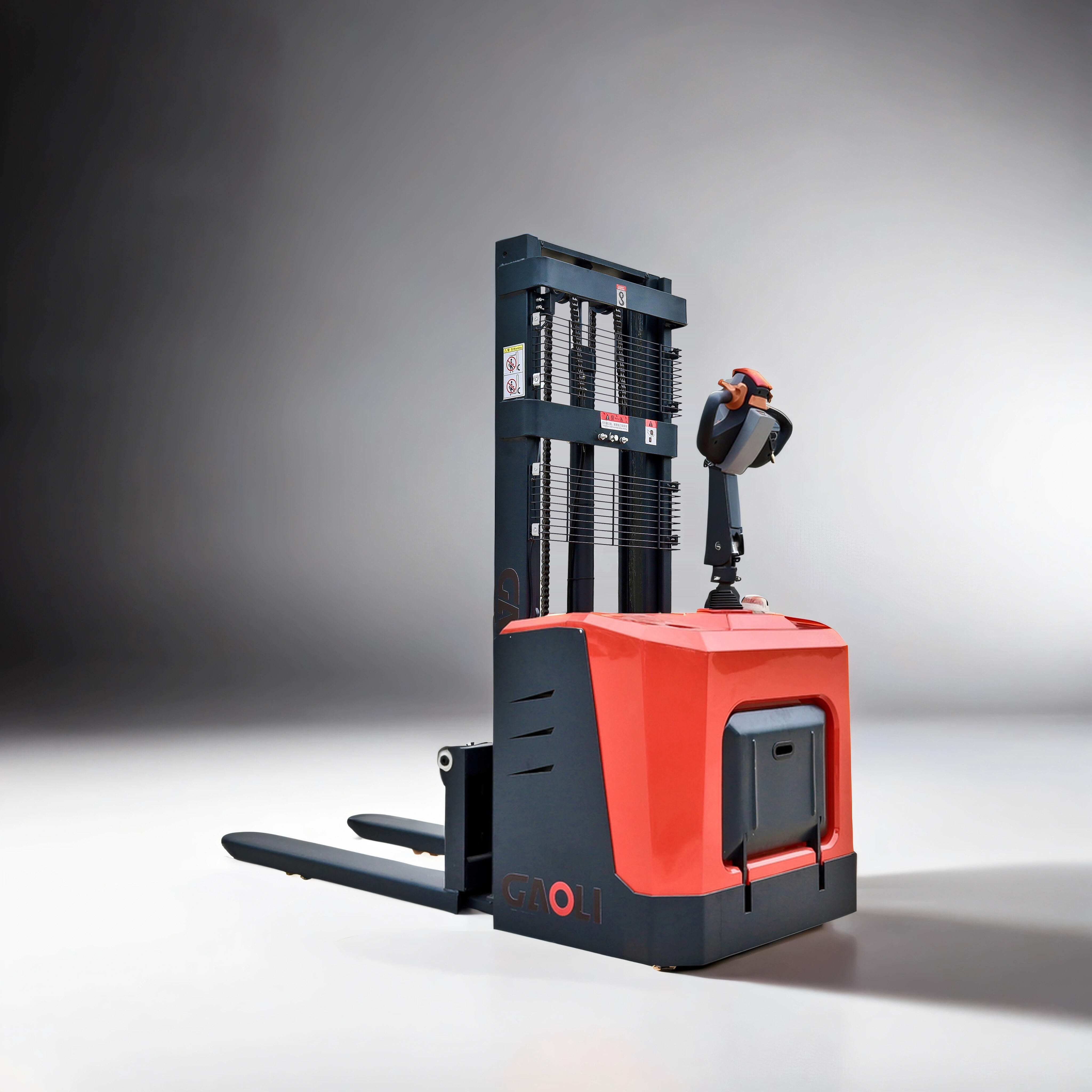لماذا تهم السعة في الشاحنات الكهربائية عربات europallet
الوقاية من الإجهاد الميكانيكي وضمان السلامة
تُعتبر قدرة حمل الشاحنة الكهربائية مهمة لتجنب أي ضغط ميكانيكي وضمان الاستقرار. يؤدي تحميل المشاية اليدوية للباليتات فوق حدود وزنها إلى إحداث ضغط ميكانيكي زائد. تم تحديد الإفراط المستمر في التحميل كسبب للفشل الميكانيكي وأيضاً سبب للتآكل المتسارع الذي يكون أقل بكثير من العمر الافتراضي لهذه المركبات. تشير المعلومات حول أعطال المعدات إلى علاقة إيجابية بين عدم توافق قدرات الحمل والطول الزمني لعمل الوحدات. الالتزام بالإرشادات السلامة التي وضعتها المنظمات مثل إدارة السلامة والصحة المهنية (OSHA) يعزز الحاجة لتوافق قدرة الحمل مع اعتبارات السلامة كوسيلة لتقليل المسؤولية، الحفاظ على سلامة المعدات، وتسهيل التشغيل الآمن.
تجنب الأعطال المكلفة والصيانة
السعة المناسبة: اختر السعة الصحيحة، وستقلل من كمية الصيانة التي يجب عليك التعامل معها - وليس فقط تكلفة ذلك! يُقدَّر أن اختيار الحجم الخاطئ يمكن أن يزيد من تكاليف الصيانة بنسبة 30%. هناك أيضًا العديد من الحالات غير الرسمية التي توضح أن الشركات التي تعمل خارج هذا الخط الأمامي للفعالية قد تواجه أعطالًا مكلفة، مما يؤكد التأثير المالي. تحتاج إلى السعة المناسبة لمنع تدهور أجزاء الشاحنة، مما يوفر لها من الأعطال المتكررة ويضمن عمر عمل أطول. بالإضافة إلى ذلك، باستخدام ضمانات ودعم الشركة المصنعة، على سبيل المثال ضمن حدود الحمل الموصى بها، توفر الشركات المال على إصلاحات مكلفة أو مشتريات جديدة، وتتبع بذلك نهج إدارة التكلفة الاستراتيجي.
السعة كأساس للكفاءة التشغيلية
الشروط المعقولة لحمل الحمولة هي أساس تحسين كفاءة العمل للشاحنات الكهربائية للباليت. الكفاءة في القدرة على التحميل والتفريغ، اختيار وتعبئة، ومن مستودع إلى آخر قد ساهمت حقًا في تحسين كفاءاتنا التشغيلية وهي ببساطة جزء أساسي من ميزتنا التنافسية. المؤشرات الأداء مثل أوقات الدوران ومعدلات العبور تعرض تحسينات في الكفاءة من خلال مطابقة قدرة شاحنة الباليت مع المتطلبات التشغيل. استغلال القدرة هو عامل يعزز الإنتاجية ويؤثر مباشرة على مدى سلاسة عمليات العمل، وعلى كيفية تقليل وقت التوقف لتمكين المهام من التدفق بأسرع ما يمكن. تحسين اللوجستيات يؤدي التعامل غير الفعال مع الحمل إلى نتائج تشغيل ليست مثلى (على سبيل المثال، التكلفة الأعلى نتيجة تعزيز الحمل).
نتائج أقلالية تقدير احتياجات السعة
ال put-on المبكر وفشل المكونات
تحديد سعة غير كافية قد يؤدي إلى التآكل وفشل خطير في شاحنة الرفوف الكهربائية. وهذا عادة ما يؤدي إلى تقليل عمر المعدات. وقد أظهرت دراسات بحثية حول المشكلات الميكانيكية في الري القاعدي أن هناك علاقة مباشرة بين الاستخدام غير الكافي من قبل المستخدم النهائي والمشاكل الميكانيكية مثل العطل وعدم الكفاءة. على سبيل المثال، فإن تحميل شاحنة الرفوف باستمرار فوق طاقتها سيضع ضغطًا غير طبيعي على النظام الهيدروليكي والإطارات، مما يؤدي إلى أعطال متكررة. بعد كل شيء، شراء شاحنات الرفوف بقدرة تحمل خاطئة مكلف جدًا لإعادة الصيانة أو الإصلاح؛ لذلك، التخطيط الدقيق للسعة هو الأساس.
زيادة تكاليف الصيانة والوقوف عن العمل
استخدام شاحنات الألواح الكهربائية ذات السعة غير المناسبة يمكن أن يؤدي إلى زيادة تكاليف الصيانة والوقوف عن العمل بنسبة تصل إلى 30 بالمائة. تُظهر الأمثلة الواقعية أن الشركات التي ترتكب أخطاء في متطلبات السعة تعاني من زيادة وقت التوقف المرتبط بتأثير ذلك على أدائها التجاري. هذا الوقت المفقود يعطل العمل والخدمة، مما يتطلب إصلاحات وصيانة أكثر تكرارًا، مما يؤدي إلى زيادة تكاليف الصيانة. باستخدام إدارة السعة الذكية، يمكن للشركات تقليل الصيانة غير المخطط لها والوقوف عن العمل - مما يوفر الوقت والمصادر. استخدام السعة الصحيحة يساعد في الحفاظ على مستويات الأداء وتقليل الانقطاعات غير المتوقعة.
مخاطر السلامة الناتجة عن الإفراط في الحمل عربات europallet
تُعد المركبات الشاحنة التي تتجاوز الحمولة الآمنة مصدرًا لعديد من مشكلات السلامة، وقد تسبب العديد من الحوادث الصناعية والإصابات. تكون الأرقام مخيفة عندما يتعلق الأمر بالحوادث المهنية الناتجة عن تجاوز حدود الحمل. بالنسبة للشاحنات الكهربائية، من الضروري جدًا الالتزام بحدود الحمل القانونية لضمان سلامة مكان العمل. يشير هذا التزام بالسلامة إلى أهمية تدريب الموظفين بشكل جيد حتى يتمكنوا من الالتزام بقيود السعة. من خلال منع حالات الإفراط في الحمل من خلال وعي المشغلين، يمكن للشركات تعزيز بيئة أصول أكثر أمانًا وتقليل الحوادث المتعلقة بالمعدات.
التأثير المباشر للطاقة على كفاءة العمليات
تقليل دورة النقل من خلال التحجيم المناسب
اختيار الشاحنة المناسبة بسعة مناسبة هو عامل رئيسي في تقليل أوقات التعامل ودورة النقل داخل المستودعات. فيما يلي من بين الفوائد: تحديد السعة المناسبة يساعد في ضمان أن شاحنات الألواح الخشبية للأعمال التجارية تحمل حمولة وزنية مثلى، بحيث لا يكون هناك حاجة لإجراء عدد كبير من الرحلات لنقل البضائع بكفاءة. على سبيل المثال، عند تصميم المستودعات باستخدام استراتيجيات سعة محسّنة، يتم العثور على وقت التعامل قد تم تقليله بشكل كبير بسبب ذلك يتم تقليل دورة النقل بشكل كبير أيضًا. هذا النهج يسمح للمشغلين بالتركيز على مهام أخرى مهمة من خلال تنظيم الحمولة بشكل فعال، مما يحسن المؤشرات التشغيلية المتعلقة بكفاءة النقل.
تحسينات في عمليات المستودع
تعتمد سرعة معالجة النظام للبضائع أو المهام - وهي مقياس يُعرف بالمرور الكلي - بشكل كبير على حجم مناسب لسعة شاحنات الرفوف بالنسبة لمتطلبات تدفق العمل. تُظهر الحالات البارزة في الصناعة نجاح تناسب السعة مع متطلبات العمل لزيادة كفاءة المستودع. وقد أعلنت الشركات الناجحة مثل أمازون عن تحسينات ملحوظة في المرور الكلي بعد تحسين أنظمتها التخزينية وفقًا لتخطيط سعة شاحنات الرفوف. ووفقًا للمعايير الأداء، يمكن للتخطيط السليم للسعة أن يؤدي إلى عمليات أكثر سلاسة وكفاءة أعلى للمستودع، مما يوضح الدور المحوري لتوفيق السعة لتحقيق التميز التشغيلي.
توفير الطاقة مع التنسيق الصحيح للسعة
بينما يكون توافق السعات فعليًا مثاليًا من ناحية، فإن التأثير الموفر من حيث المال والبيئة بشكل عام لا يمكن تجاوزه. وبشكل مثير للاهتمام، تم العثور على الطاقة المستهلكة بواسطة شاحنات europallet عند سعة غير صحيحة تكون مختلفة جدًا، مما يشير إلى ضرورة تحقيق توافق دقيق في السعة. تبرز التدابير المستدامة كما هو الحال في المستودعات الحالية أهمية كفاءة الطاقة وتوافق السعة، مما يساعد على تقليل استهلاك الكهرباء وبالتالي المساهمة بشكل كبير في تخفيض التكاليف التشغيلية. وضع كفاءة الطاقة كأولوية مع القدرات المناسبة يساعد الشركات على تعزيز عزيمتها للحفاظ على الجوانب المالية والبيئية ضمن عمليات المستودعات.
عالي السعة الكهربائية عربات europallet للتطبيقات المطلوبة بشدة
الصناعات التي تتطلب حلولًا ثقيلة
عند التحدث عن التطبيقات الصعبة، مثل التصنيع أو البناء أو اللوجستيات، فإن هناك حاجة إلى آلات قوية مثل شاحنة تحميل كهربائية بقدرة 3000 كجم. خصوصًا في الصناعة، يتطلب التعامل بكفاءة مع المواد الخام الكبيرة ومخازن المنتجات حلولًا من هذا النوع. ومع ذلك، يمكن للشركات التي تقدم خدمات اللوجستيات الاستفادة من هذه الشاحنات بتحسين الأنشطة في المستودعات ذات الإنتاجية العالية. دليل السوق يؤكد هذا الاتجاه وهو بلا شك متأثر باهتمام كبير بشاحنات التحميل ذات السعة الكبيرة، بسبب الحاجة لتحقيق مستويات إنتاجية طموحة داخل... هذه البيئات.
خصائص طرازات السعة العالية التجارية
شاحنات التحميل الكهربائية ذات السعة العالية المستخدمة في الشركات التجارية تختلف عن النماذج القياسية، فهي مزودة بوظائف متقدمة ومتانة. تحتوي على نظام قوة قوي، ومحرك كهربائي بعزم دوران عالٍ، وشعور ممتاز بالتحكم حتى لو كانت الرياح أقوى من إعصار. وهذا هو السبب أيضًا في استخدام بطاريات الليثيوم أيون بحيث تحصل على وقت تشغيل أطول ووقت شحن أقل. يتم قيادة التطوير من قبل الشركات المصنعة مثل تويوتا وكراون، والتي تعتبر نماذجها عالية السعة الأكثر مبيعًا بسبب موثوقيتها والتكنولوجيا الجديدة.
التقدم باستخدام بطاريات الليثيوم أيون في الشاحنات عالية السعة
إضافة تقنية الليثيوم أيون إلى الشاحنات الكهربائية ذات السعة العالية قد غيرت بالفعل أداء المستودعات من حيث الإنتاجية ووقت التشغيل. الشركات التي انتقلت من البطاريات التقليدية إلى تقنية الليثيوم أيون لاحظت زيادة في مؤشرات الأداء وزيادة عمر البطارية. على سبيل المثال، ذكرت إحدى شركات اللوجستيات أنها حققت تحسناً بنسبة 20٪ في كفاءة التشغيل بعد الترقية، بالإضافة إلى انخفاض كبير في وقت التوقف. تحليل العائد على الاستثمار (ROI) بين استثمار تقنية الليثيوم أيون واضح من حيث توفير التكاليف على المدى الطويل والمساهمة في الاستدامة البيئية طويلة الأمد، مما يجعلها حلاً ممتازًا للشركات التي تسعى إلى تحقيق أقصى استفادة من متطلبات السعة العالية.
الامتثال للسلامة من خلال اختيار القدرة المناسبة
المعايير التنظيمية لمعالجة الحمولة
نحتاج إلى اتخاذ جميع التدابير لضمان توافق عملياتنا مع اللوائح، مع الانتباه إلى سلامة مكان العمل وتجنب المخاطر المتعلقة بالإجراءات القانونية. توضح OSHA (إدارة السلامة والصحة المهنية) و ANSI (المعهد الأمريكي للمعايير الوطنية) بعض البروتوكولات المتعلقة بعمليات نقل الأحمال باستخدام الشاحنات الرفيعة الكهربائية. تعتبر الامتثال لهذه اللوائح أمرًا حاسمًا لأن أي خرق لهذه السياسات يمكن أن يؤدي إلى غرامات كبيرة مثل العقوبات المالية وإيقاف النشاط التجاري. على سبيل المثال، شملت إحدى الحالات البارزة شركة لوجستية تم تغريمها بسبب حادث خطير نتج عن الإفراط في الحمل، مما أدى إلى ظروف مخالفة لمعايير OSHA.

تطابق السعة مع الحمل لمنع الحوادث
الوقاية من الحوادث في المستودعات تعتمد بشكل كبير على استراتيجية مطابقة القدرة مع الحمل. استخدام القدرة بحذر يقلل من احتمالية وقوع الحوادث، حيث تشير بيانات منظمة السلامة إلى أن معدلات الحوادث تكون أقل في المواقف التي تم فيها تنفيذ مطابقة فعالة للحمل. على سبيل المثال، وجدت دراسة لمجلس السلامة الوطني أن المستودعات التي لديها برامج قوية لمطابقة القدرة مع الحمل شهدت انخفاضًا بنسبة 30 بالمائة في الحوادث السنوية. هذه النتائج تسلط الضوء على الحاجة إلى التدخلات لتدريب الموظفين حول كيفية مطابقة القدرات لأعمال الرفع، والتأثير المحتمل على سلامة مكان العمل.
متطلبات الوثائق والتدريب
الامتثال للمعايير الأمنة المستندة إلى القدرة يتطلب وثائق وبرامج تدريبية صلبة يمكن أن تستغرق وقتًا في إكمالها، رفعها، وتتبعها. وهذا لتقديم التحقق من أن مختلف بروتوكولات السلامة يتم اتباعها، وسيكون ذلك مفيدًا في حالة أي عمليات تدقيق أو فحص. بالإضافة إلى ذلك، يحتاج المشغلون إذا أمكن إلى تدريب حول مدى قدرة الأنظمة على تحمل العبء، وهذا ضروري للأشخاص الذين يشغلون الآلات لضمان التدابير الوقائية لتشغيل آمن. 'إذا كان تدريبي وفحص قدرتي يستند إلى جودة عالية، فإن سجل سلامتي يتحسن وهذا بالضبط ما يحدث مع الشركات الرائدة اليوم.' مثل هذه المبادرات لا تُинформ فقط بل تمكّن الموظفين ليعرفوا ويستخدموا القواعد يومياً أثناء العمل، مما يجعل مكان العمل أكثر أمانًا للجميع.
الأسئلة الشائعة
ما هي أهمية السعة في الشاحنات الرفيعة الكهربائية؟
السعة أمر حاسم في منع الإجهاد الميكانيكي، وتلافي الأعطال المكلفة، وتعزيز كفاءة التشغيل، وضمان السلامة. استخدام السعة الصحيحة يمنع الضغط غير الضروري على المعدات، مما يُحسّن من عمر التشغيل ويقلل تكاليف الصيانة.
كيف يؤثر اختيار السعة الخاطئة على تكاليف الصيانة؟
يمكن أن يؤدي اختيار السعة غير المناسب إلى زيادة تكاليف الصيانة بنسبة تصل إلى 30% بسبب التآكل الإضافي للمكونات، مما يؤدي إلى إصلاحات وأعطال أكثر تكرارًا.
ما هي عواقب تقدير احتياجات السعة بشكل أقل في شاحنات europallet؟
قد يؤدي تقدير احتياجات السعة بشكل أقل إلى التآكل المبكر، وفشل المكونات، وزيادة تكاليف الصيانة، والوقوف عن العمل، والمخاطر المتعلقة بالسلامة نتيجة للحمل الزائد، مما يؤثر في النهاية على أداء الأعمال العامة.
كيف يمكن أن تحسن تقليص القدرات الكفاءة التشغيلية؟
تقليص القدرات يقلل من أوقات التعامل ودورة النقل، مما يعزز الإنتاجية ويوفر الطاقة، مما يؤدي إلى تحسين عمليات المستودع والأداء التشغيلي المتميز.
لماذا تعتبر الشاحنات الكهربائية ذات السعة العالية ضرورية لبعض الصناعات؟
تتطلب الصناعات مثل التصنيع والبناء واللوجستيات شاحنات ذات سعة عالية لhandling الأحمال الضخمة لتحقيق أهداف الإنتاجية بكفاءة.

